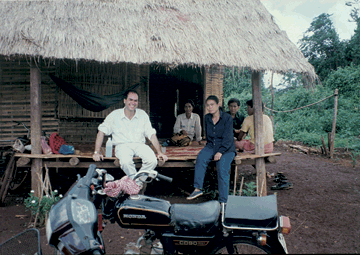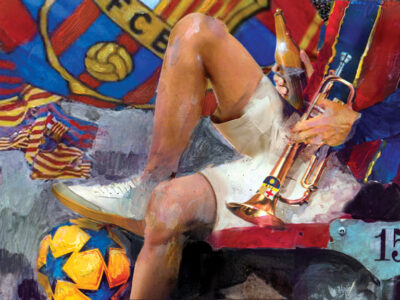
Learning about luck—and the perfect gift—in Cambodia.
By James Ross | We had barely arrived in Banlung, the provincial capital of Ratanakiri, when Sophal suggested we go shopping.
“Shopping? Here?” I said with more than the usual dose of skepticism.
Ratanakiri wasn’t even in the middle of nowhere. It was off on the edge of it somewhere, in Cambodia’s forested, malarial, sparsely populated northeast. It didn’t help that I nearly had died from cigarettes getting there. Not from smoking them nor even from the second-hand smoke of my fellow passengers. No, the antediluvian Soviet-made airliner had been overstuffed with boxes of ersatz Marlboros destined to be smuggled into neighboring Vietnam. I could hear the plane’s joints creak as we took off from Phnom Penh.
When we touched down an hour later on Banlung’s red clay runway, there was a huge crowd waiting to greet us. Not a good sign. My first thought was renewed civil strife: Land disputes between the locals and the corrupt officials who were trying to take it from them could get ugly. Perhaps they were just cigarette-starved chain-smokers awaiting the plane’s cargo. Only later did I discover that “watching the airplane land” was high on the list of Things to Do in Banlung.
With our luggage over our shoulders, Sophal and I pushed our way through pushcart vendors hawking dodgy dried beef, whole roast sparrows on spits, and steamed sweet surprise inside a banana leaf. For a six-month veteran of Cambodia like myself, the usual Cambodian sidewalk fare had already lost its appeal.
“Sophal. What would you possibly want to buy here?”
“For my wife. I don’t know name in English. But she will be very happy.”
Sophal and I both worked for an international human-rights group investigating abuses by the Hun Sen government and the Khmer Rouge. Torture and killings, not bargains, was the usual topic of our field trips.
Banlung was hardly a shopper’s paradise. Indeed, it was hardly anything at all. Broad yet empty dirt roads dominated the city center. Two-story wood and cement shop-houses provided the skyline. There were few places to stay and even fewer to eat. The guesthouse where we settled was best known for having been a brothel for U.N. peacekeepers in the early ’90s.
“Sophal, whatever it is, you’re not going to find it here.”
“We’re not looking in Banlung. We’re going to the countryside.”
I didn’t argue. It’s why we had come to Ratanakiri—to see the hills and the waterfalls and the famous volcanic lake that was crystal clear and perfectly round. Although Pol Pot once had his headquarters in the province, the Khmer Rouge had been gone from this area for many years. That meant no landmines. You could just hop on a motorbike, find a road out of town, and ride without regard—at least until you reached the Vietnam border. In Cambodia, that’s a big deal.
The next morning I was enjoying a chewy baguette and a coffee served up the Vietnamese way, with gloppy sweetened condensed milk, when Sophal pulled up on a motorbike he had rented from the guesthouse. The cool clean air was a pleasant change from Phnom Penh’s heat and dust.
“Time we go,” said Sophal, an impish smile creeping through his normally staid demeanor. “The gift for my wife is hard to find. And the rainy season is not yet finish.”
By which he meant we were going to be on the bike for hours and that we’d probably get drenched if we dawdled. It was, nonetheless, a departure from our usual road trip, which would take us to major towns or obscure villages, always to uncover why some soldier or policeman or Khmer Rouge cadre had decided to shoot a bunch of people dead.
We headed out of town on a bumpy dirt track the map labeled National Highway 19. Ratanakiri is blessed with rolling hills and abundant vegetation, and I took in the greens and yellows in all their sun-drenched shades. Sophal did his best to minimize the sudden jolts from rock and root that paved the highway.
We idled a few minutes in a long-abandoned French rubber plantation. Gnarled rubber trees well past their productive prime stood in checkerboard symmetry. A breeze rustled the leaves and the heavy shadows flickered. With my T-shirt I wiped the red dust from my sunglasses.
Sophal broke the silence of the moment. “I always feel different when I go to the mountain. It is because of Khmer Rouge time.” Like most Cambodians, Sophal rarely spoke of the “Killing Fields” years unprodded.
“My family, we were forced to leave Phnom Penh and walk for several weeks. The Khmer Rouge order us to Phnom Aural, the big mountain in Kompong Chhnangprovince. They sent us to the mountain to cut the trees. Most days they give us a little rice but that is all. So you have to find your own food to live. But if the Khmer Rouge learn you look for food in the forest, like mushroom or wild fruit, then they punish you. Kill you maybe. Many, many people they died. Jim, I got so very thin!”
He patted his now prosperous belly, and I recalled the photo he once showed me from the refugee camp in Thailand. Such a frightfully skinny kid then. It was 1982. I was graduating college and going on to law school. He was skin and bones in a refugee camp with 250,000 other more-or-less survivors of the Khmer Rouge.
“My family was more lucky than most,” he said and climbed back on to the motorbike. “We all were very hungry and sick on the mountain, but all my parent and brother and sister live. We were very lucky.”
It was hard for me to comprehend any concept of luck that included enduring the worst of the Khmer Rouge years.
We traveled deeper into the countryside. Stretches of new-growth forest gave way to more recently cut areas, painful wastelands of stump and brush. The old forest—thick with koki and khvao and a hundred other tree species—endures, but is seen only from a distance, from bare hilltops with commanding views. The Kreung highlanders, the indigenous people of the hills, worry that the spirits will no longer have a place to live once the old forest disappears. And homeless spirits are very dangerous.
We’d been on the motorbike for several hours and had nearly given up: Sophal of his hope of pleasing his wife, and me of all sense of feeling in my tuches. As we zoomed by a rattan-and-bamboo house standing by its lonesome, Sophal suddenly squeezed the brakes, causing us to come to a skidding stop.
“There, Jim! See? That’s what I’m looking.” All I could see was a yard overrun with tropical underbrush, punctuated by scraggly banana plants and stunted jackfruit trees. The smell of wood smoke was in the air. “There for my wife. Look!”
And there it was. Hanging by a rope from the limb of a jackfruit tree. A dark, deflated football. “We came all this way for, uh, that? What is it?”
“It’s a stoh-match.”
“Huh?”
“Stoh-match. An animal stoh-match.” Sophal’s tragic flaw was to pronounce English words as they were written.
“Stomach, Sophal, stum-uck.”
I tried guessing the species of animal insides on display, but he could only remember the name in Khmer.
We tried 20 Questions.
“Does it eat people?”
“No.”
“Do people eat it?”
“Hmmm, sometimes.”
Our Abbott and Costello routine was cut short by the appearance of an elderly woman. She was barely four feet tall and had wrinkles as rough as Ratanakiri’s roads. Her hair was pulled back tight, revealing bright eyes and a sunken mouth. A beaded necklace graced her neck, silver bracelets jangled at her tiny wrists. Heavy earrings had stretched her earlobes beyond the breaking point, and they dangled, torn, nearly down to her shoulders.
Sophal spoke a few words in Khmer, but it was soon evident it wasn’t her language. He pointed at the deflated curiosity, and she smiled a toothless smile and disappeared into the house. A few minutes later emerged a man wearing shorts and plastic flip-flops. The son.
Right behind him were two giggling girls. They reminded me of my nieces back in Boston, ages 6 and 9.
The man spoke some Khmer and after a few pleasantries the bargaining began. Cambodian men are feckless hagglers, and the deal was done in seconds. A joyful Sophal paid out a stack of riel six-inches high, about five dollars worth.
“Cute little kids,” I said. In GI Joe fashion I pulled out a half-finished roll of Lifesavers and gave it to the older one. They smiled, I smiled. “How old are they?”
It was not until we were back on the rented motorbike heading towards Banlung, the stomach nestled in the metal basket in front, that Sophal told me the answer. “The father says his children are 13 and 15.” Sophal shook his head. He had daughters of his own and was as shocked by their ages as I was. “Very sad. They get nothing to eat. All their lifes they get nothing to eat.”
As predicted, ominous gray clouds began forming above us. I noticed that the fuel gauge was nicking the E of empty. Great. We would be caught out in the rain, without gas, miles from the nearest village. Of course, we did have what we came shopping for.
“So, Sophal, what exactly does your wife do with animal stomachs?”
“How do you call animal with sharp hair?”
A light bulb flashed. “Oh, a porcupine?”
“Yes. Porcupine. My wife will be very happy.”
“But what does she do with it?”
I could feel the first drops, the large slow ones, plopping on my head and arms. But Sophal seemed oblivious to the impending downpour and the empty gas tank.
“I don’t know. For medicine I think, though I’m not really sure. But my wife will be very happy. She love this kind stoh-match.”
The rain was soon coming down hard. Sophal kept his head down and persisted through the muck and mire, the dark and dried Holy Grail leading the way.
It must have been a rock. Or a protruding root. I never went back to check. But the front tire hit it the wrong way and in an instant Sophal was flying headfirst over the handlebars, and I was falling hard left, with the bike right behind me. A muddy, rainy silence ensued.
“Sophal. You okay?”
“Yes, Jim. My arm hurts. But it’s not broken. How are you?”
I was sprawled out on my back. Soaked to the bone. My left leg was twisted under the motorbike. My left arm was scratched up from the rocky tumble. My shoulder ached. I turned my head. There, two inches from my face, was a dark, dried, semi-inflated, medicinal porcupine stomach. I laughed and laughed until it hurt.
James Ross C’82 has worked for human rights groups in the Philippines, Cambodia and Bosnia, among other places. He is currently Senior Legal Advisor for Human Rights Watch in New York.




